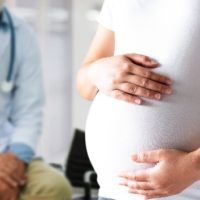
Blue Planet Studio/iStockBy KATIE KINDELAN, ABC News
(NEW YORK) — With two COVID-19 vaccines possibly being authorized by the U.S. Food and Drug Administration (FDA) this month, the question remains when pregnant people will be able to access a vaccine.
Pregnant people have not been actively included in the late-stage clinical trials for any COVID-19 vaccines, including the Pfizer and Moderna vaccines in the United States. As a result, the CDC’s independent advisory council said Tuesday that when the vaccines are authorized in the U.S., they will not be recommended for people who are pregnant.
“We just don’t have any data to say that’s OK yet, because [pregnant people] weren’t included in the trials,” Dr. Rashmi Rao, a maternal-fetal medicine specialist at UCLA Medical Center in Los Angeles, told “Good Morning America.” “It’s an important population subset.”
Not recruiting parents-to-be in clinical trials and medical research is nothing new, according to both Rao and Dr. Ruth Faden, the founder of the Johns Hopkins Berman Institute of Bioethics and a bioethicist who studies the ethics of pregnancy and vaccines.
“For a very long time, pregnant women were not included in biomedical research evaluation efforts or clinical trials, both for concerns about fetal development and what would be the implications of giving a pregnant women an experimental drug or vaccine and also for legal liability worries from manufacturers and pharmaceutical companies,” Faden told GMA. “There’s a huge gap between what we know about the safety and effectiveness of a new drug or a new vaccine for the rest of the population and what we know about it specific to pregnancy.”
In the case of the COVID-19 vaccines, health experts have only one of the three sources of evidence that are used to evaluate safety and efficacy during pregnancy: the data on non-pregnant people who were enrolled in the clinical trials, according to Faden.
From that, Faden said health experts can try to glean what side effects may happen to people who are pregnant, but it is not an exact science.
However, it’s considered typical — and many argue ethically appropriate — to study an unknown substance first in healthy adults, and then progressively in broader and broader populations. Pregnant people and children are often tested later down the line because of concerns about potential long-term harm.
Meanwhile, while ongoing COVID-19 vaccine clinical studies don’t include pregnant people directly, some of the volunteers who sign up may become pregnant during the trial, which will give researchers some insights about the vaccine’s safety among this group.
Dr. Stephen Hahn, commissioner of the U.S. Food and Drug Administration (FDA), said Tuesday that the agency does plan to look at that data.
“In the clinical trials, we did not require a pregnancy test for entry into the clinical trials, which means that when we look at the data, there are likely going to be women of childbearing age who have gotten pregnant,” Hahn told ABC News chief medical correspondent Dr. Jennifer Ashton in an interview on ABC News’ Instagram Live. “So we are likely to be able to see data. I can’t prejudge those data, but it’s one of the things we’ll have to look at.”
“Will that be enough data for us to have confidence and say pregnant women should be vaccinated? I think that’s something that we’ll have to take a look at,” he added.
Neither Pfizer nor Moderna have publicly released a timeline yet for including pregnant people in clinical trials.
Pfizer began opening its clinical trial to children as young as 12 earlier this fall. Moderna said in a filing Tuesday that they plan to start recruiting children 12-18 years-old to participate in their clinical trial.
Both the Pfizer and Moderna vaccines use mRNA technology, which uses pieces of genetic material to coax the body into developing defenses against future infection. If authorized, they would be the first mRNA vaccines, which are theoretically safer during pregnancy because they do not contain a live virus.
What should pregnant people do?
The question of whether an expecting parent should receive a COVID-19 vaccine will eventually come down to a number of factors, including everything from the trimester, risk factors for COVID-19, ability to remain socially distanced in their lifestyle and occupation, guidance from federal and state officials and recommendations from a person’s own physicians, according to both Faden and Rao.
Overall, people should feel comfortable that a COVID-19 vaccine is safe once authorized, but parents-to-be might need to wait a bit before receiving one, Rao said.
“The message right now is that once it gets cleared from the FDA and vaccinations become available, if it’s safe to do so for the public, then I would recommend that you get your vaccination when you’re eligible,” she said. “However, if you’re pregnant, you will likely have to wait until you’re no longer pregnant or until we gather more data regarding safety and pregnancy.”
Similar to the flu vaccine, which was not tested on pregnant people in clinical trials, health experts will need to rely on continuously incoming data to make decisions around how safe the COVID-19 vaccines are during pregnancy. Officials are doing the same for the general population, considering the speed at which the COVID-19 vaccines were developed, according to Faden, who noted that people who are pregnant should not be “unnecessarily alarmed.”
“Vaccines are coming, and they’re coming before we have all of the information that we would like to have to make recommendations for pregnant people,” she said. “But this is the context in which decisions are being made and recommendations are being made for the general population, without all of the evidence we would like to have, which is why the studies will continue.”
Dr. Christopher Zahn, vice president of practice activities for the American College of Obstetrics and Gynecologists (ACOG), told ABC News in a statement there is no “simple answer” when it comes to pregnancy and the COVID-19 vaccines.
“There isn’t a simple answer to questions about whether pregnant people, or those considering pregnancy, should take the COVID-19 vaccine, especially since no vaccine is currently approved,” he said. “When the vaccines do become widely available, unfortunately, we have no data on the safety of the vaccine in pregnant and lactating individuals because they were excluded from Phase 2 and Phase 3 clinical trials for all of the COVID-19 vaccines in development.”
“So, certainly the lack of safety and efficacy data will need to be part of the conversation that patients who are pregnant or considering pregnancy will need to have with their obstetrician-gynecologist or other health care professional,” Zahn added. “Any decisions made should be based on any available data and recommendations for use in pregnancy, patients’ individual risk factors and the potential benefits, and their unique needs, desires, and values.”
The Society for Maternal-Fetal Medicine (SMFM) released a statement Tuesday encouraging expecting parents to “engage in shared decision-making” about the vaccine with their doctors.
“In general, SMFM strongly recommends that pregnant women have access to COVID-19 vaccines in all phases of future vaccine campaigns, and that she and her health care professional engage in shared decision-making regarding her receipt of the vaccine. … mRNA vaccines, which are likely to be the first vaccines available, do not contain a live virus but rather induce humoral and cellular immune response through the use of viral mRNA,” the society said in its statement. “Health care professionals should also counsel their patients that the theoretical risk of fetal harm from mRNA vaccines is very low.”
Even now, nearly one year into the coronavirus pandemic in the U.S., many questions remain about how pregnant people are impacted by COVID-19.
The CDC has shared data showing that people who are pregnant have a significantly greater risk for severe illness from COVID-19 when compared to nonpregnant people, but they are not at a greater risk for death.
“What I tell my patients is the one thing I know for sure is that pregnant women can get COVID,” Rao said. “We’re not seeing huge rates of any adverse fetal outcomes yet, but, again, that’s still to be determined, because we have a long way to go with collecting information.”
Rao said everyone, including pregnant people, needs to remain on guard when it comes to COVID-19 by continuing to follow safety protocols, including face mask wearing, social distancing and hand washing.
Copyright © 2020, ABC Audio. All rights reserved.














